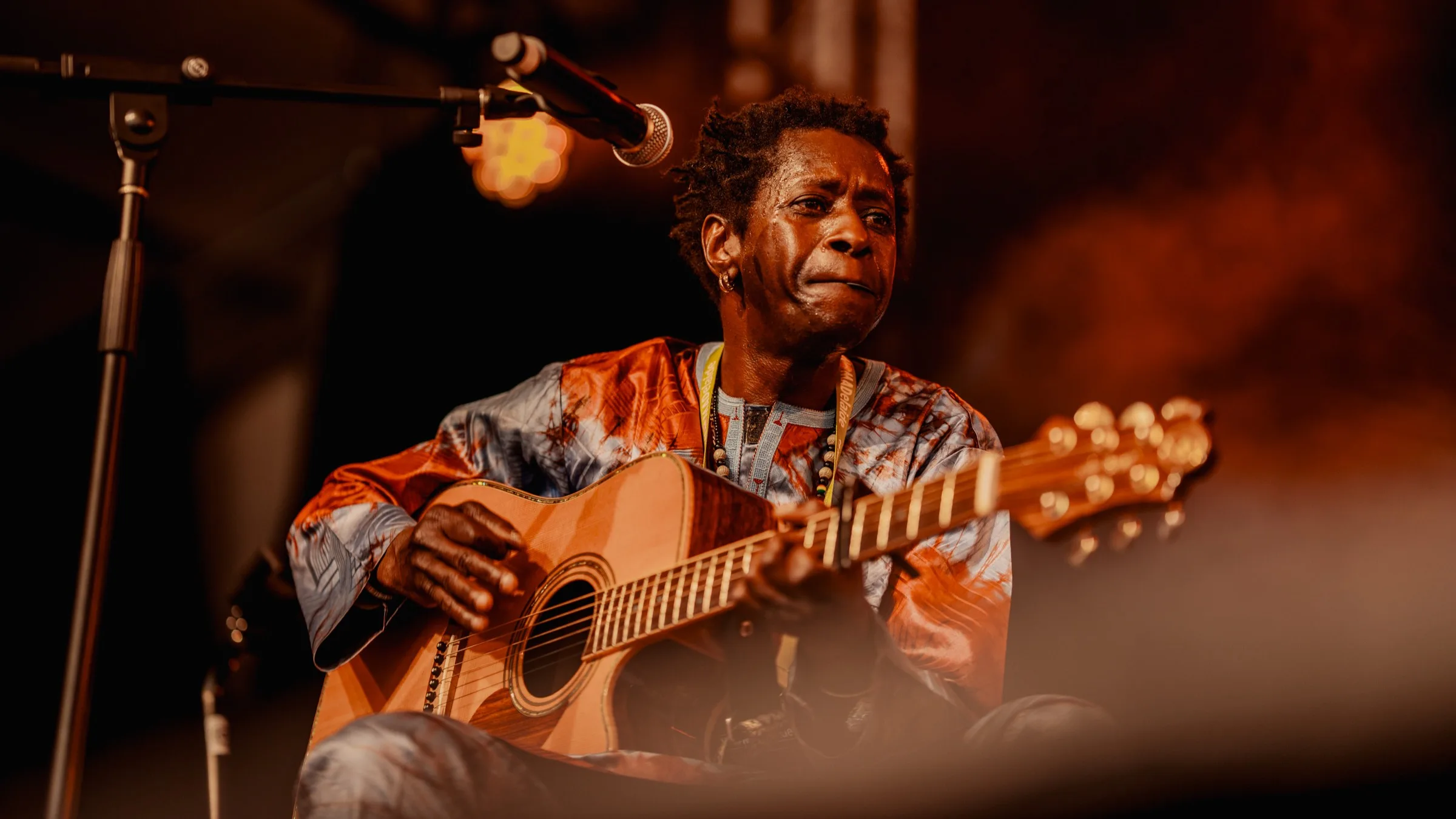By Con Pagonis OAM
Stani Goma and Con Kalamaras – two champions of Melbourne’s vibrant multicultural music scene – are working on a project to bring West African and Greek roots music together in the one performance this November.
Stani Goma is the vibrant host and mastermind behind ‘Flight 1067 to Africa’ on Melbourne Community Radio PBS 106.7FM. He pilots listeners on a mesmerising journey through the heart and soul of African music every Sunday from 3:00 to 5:00 pm. With an eclectic blend of rhythms and melodies from across the continent, Stani’s program is a sonic passport to the diverse soundscape of Africa.
Hailing from the Congo, Stani’s roots are in Brazzaville, just a stone’s throw from the pulsating beat of Kinshasa. It is the epicentre of African dance music, and has shaped his musical DNA from an early age. Immersed in this rich musical tapestry, Stani’s passion for African rhythm was ignited, becoming an inseparable part of his identity.
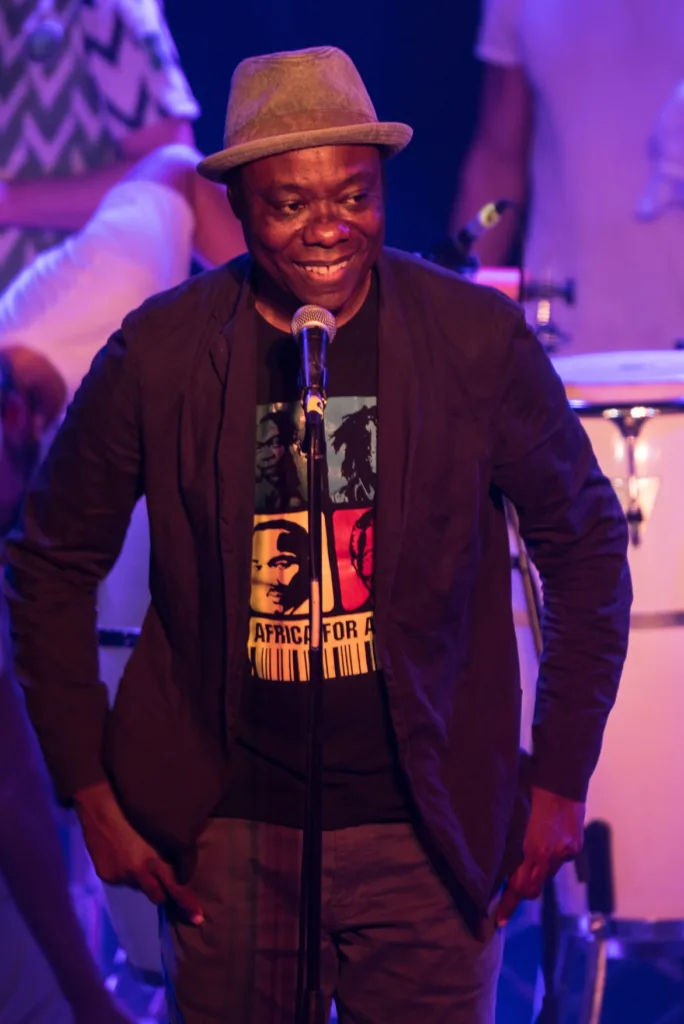
His profound knowledge and infectious enthusiasm have made him a cherished presence on the airwaves, earning him respect and admiration from audiences far and wide.
Throughout his illustrious career, Stani has had the privilege of conversing with legendary figures of African music, including the likes of Salif Keita, Youssou Ndour, Angelique Kidjo, Baba Maal, and Femi Kuti. Beyond the studio, he has lent his magnetic presence as the master of ceremonies at numerous prestigious music and community events, further cementing his status as a cultural ambassador.
Con Kalamaras is a Melbourne-based musician, events producer, and composer with a strong connection to Greek music, particularly the traditional genre of Rebetiko. His deep passion for this style has led him to produce and curate music events and festivals across Australia, Europe, the UK, and Japan. He is also an accomplished composer for film and regularly performs in various musical ensembles in Melbourne.
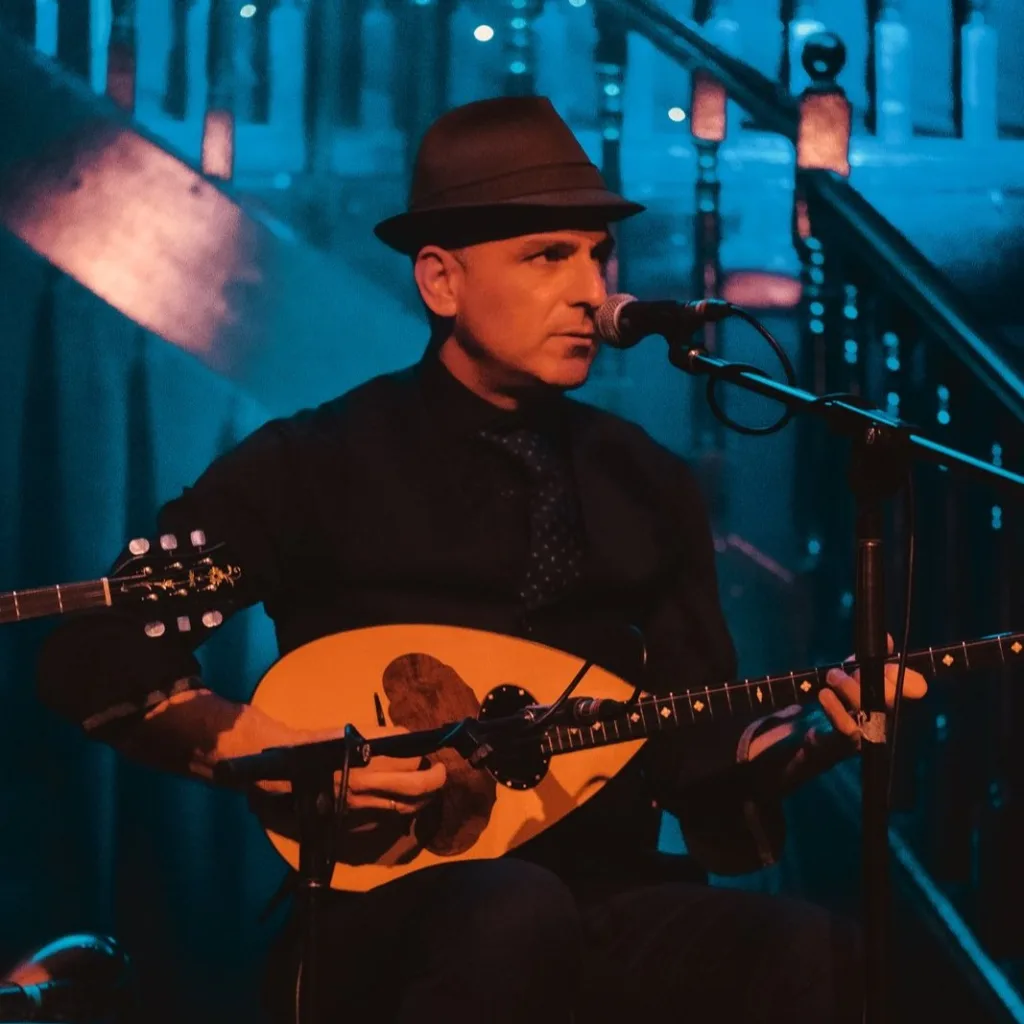
He co-founded and served as the Artistic Director of the Melbourne Rebetiko Festival from 2016 to 2019 and is currently the Co-Director of Greek Fringe, an initiative that promotes contemporary and traditional Greek culture. In addition, he runs the Melbourne Rebetiko Jam, a weekly gathering that invites musicians from diverse backgrounds to explore and share Rebetiko music.
Rebetiko is a genre of Greek urban folk music that emerged in the early 20th century, primarily among the working-class communities in cities like Athens, Piraeus, and Thessaloniki. Often referred to as the “Greek blues”, it expresses themes of hardship, exile, love, loss, and resilience.
The music was heavily influenced by refugees from Asia Minor, particularly after the population exchange between Greece and Turkey in 1923, blending elements of Greek, Turkish, and Middle Eastern musical traditions.
Rebetiko typically features instruments such as the bouzouki, baglama, guitar, accordion, and violin, and is known for its raw, emotive style and expressive lyrics.
Initially associated with marginalised groups, rebetiko has since become a celebrated part of Greece’s cultural heritage and is recognised for its historical and artistic value.
The streets of Bamako to the ports of Piraeus
Bamako is the capital and largest city of Mali. Piraeus is the major port in Greece, near Athens. Many of the people displaced from Asia Minor in 1923 settled here, very-much as an underclass.
Many African American blues aficionados will have been introduced to the West African roots of this music through Martin Scorsese’s 2003 documentary film collection ‘The Blues’. Scorsese directs the first in this series of seven films by seven different directors, each approaching the development of the blues from a different perspective.
Scorsese’s first episode – ‘Feel Like Going Home’ – follows musician Corey Harris as he interviews fellow musicians and goes in search of the birthplace of the Blues, travelling through the Mississippi Delta and beyond to West Africa from where the music was first brought to America on slave ships. In the film, Corey Harris travels to Mali in West Africa to uncover the spiritual home of the music. He meets musicians and compares the folk music of this region to his own, discovering many similarities and parallels.
Stani and Con’s cross-cultural music project will take the audience on a journey from the streets of Bamako to the ports of Piraeus. They will bring together a West African blues band – Mande Blues Ensemble – and the Estudiantina of Melbourne rebetiko ensemble to explore musical commonalities.
Mande Blues Ensemble is a captivating meeting of tradition and innovation. They bring the rich musical heritage of West Africa into dialogue with the deep, resonant tones of the blues. Led by acclaimed musicians Aboubacar Djelike Kouyate (Kamalengoni, guitar and percussion) and Amadou Suso (Kora), they explore the shared roots of these traditions, tracing a musical lineage that spans centuries and continents. Hailing from esteemed griot families of Mali and Gambia, Kouyate and Suso are master storytellers and instrumentalists, weaving intricate melodies and hypnotic rhythms into an evocative soundscape. Their music carries the warmth of oral tradition while embracing contemporary influences, offering an experience that is both deeply authentic and refreshingly modern.
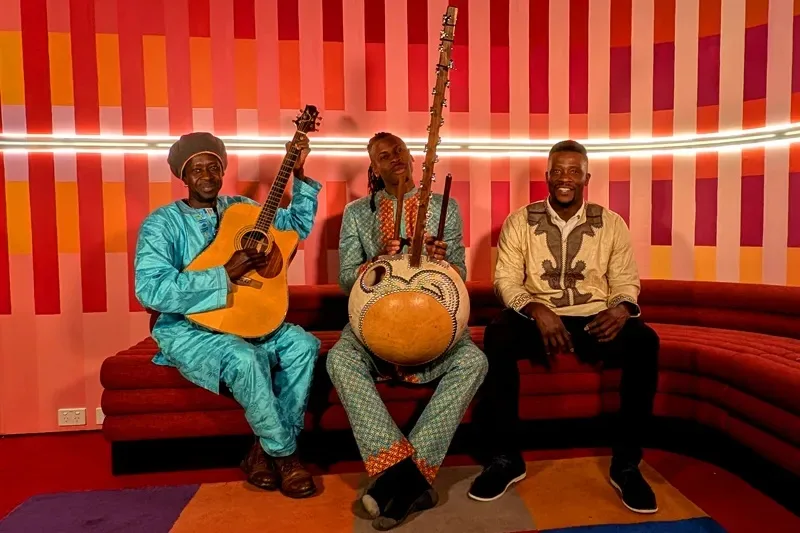
Estudiantina of Melbourne is a vibrant and dedicated musical ensemble founded in January 2024, committed to preserving and reinterpreting traditional Greek music—particularly the rich and evocative genres of Smyrneika and Rebetiko. The name “Estudiantina”, meaning “students”, reflects the ensemble’s ethos of continual learning, cultural curiosity, and musical exploration.
Breathing new life into Greek rebetiko music, often called the ‘outlaw blues’ of Greece, Estudiantina of Melbourne blends the lively tones of the bouzouki with influences from Greek, Turkish, Jewish, and Armenian musical traditions. With a masterful combination of instruments, their performances resonate with spellbinding innovation and timeless allure.
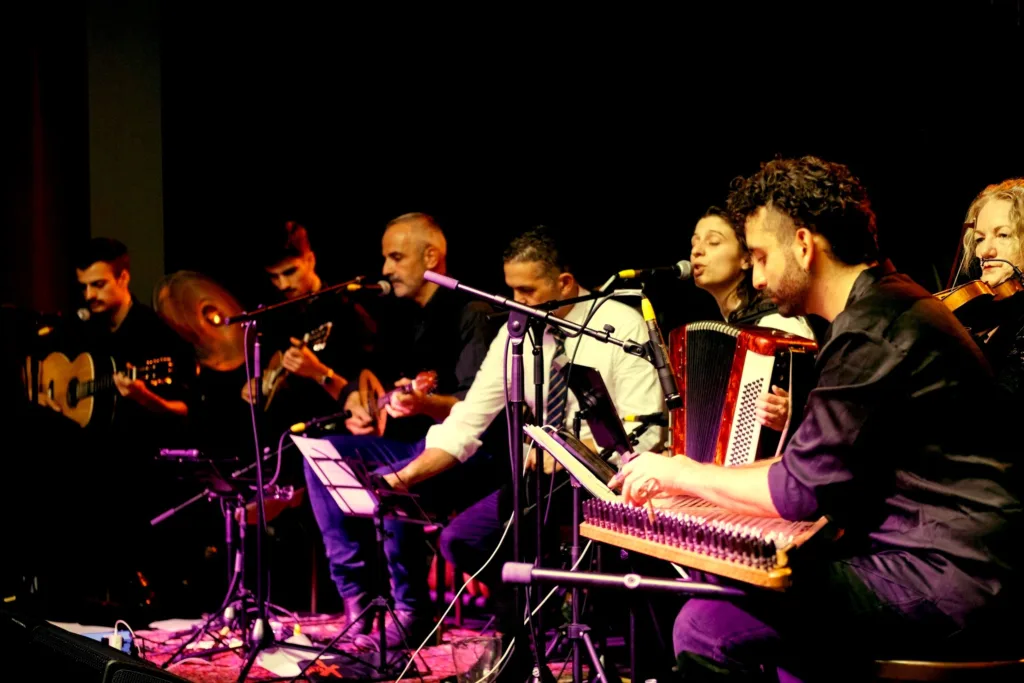
Smyrneika music originates from the cosmopolitan city of Smyrna (modern-day Izmir), renowned for its unique synthesis of Greek, Turkish, Jewish, and Armenian influences. Characterised by its melodic richness and emotional depth, Smyrneika captures the multicultural spirit of Asia Minor. Rebetiko, often referred to as the “Greek blues”, emerged in the early 20th century from Greece’s urban working-class communities. With themes of exile, longing, love, and resilience, Rebetiko offers a poignant and deeply expressive musical experience.
Estudiantina of Melbourne employs an array of traditional instruments—including the oud, bouzouki, violin, qanun, accordion, and guitar—to produce a soundscape that is at once authentic and contemporary. Through this blend of tradition and innovation, the group creates performances that are both historically grounded and emotionally resonant.
In March 2025, the ensemble launched its debut album, ‘Journey to Rebetika’, to a sold-out audience at the Brunswick Ballroom. This landmark performance not only introduced their distinctive sound to a wider audience but also demonstrated their passion for the living tradition of Greek music in the diaspora context.
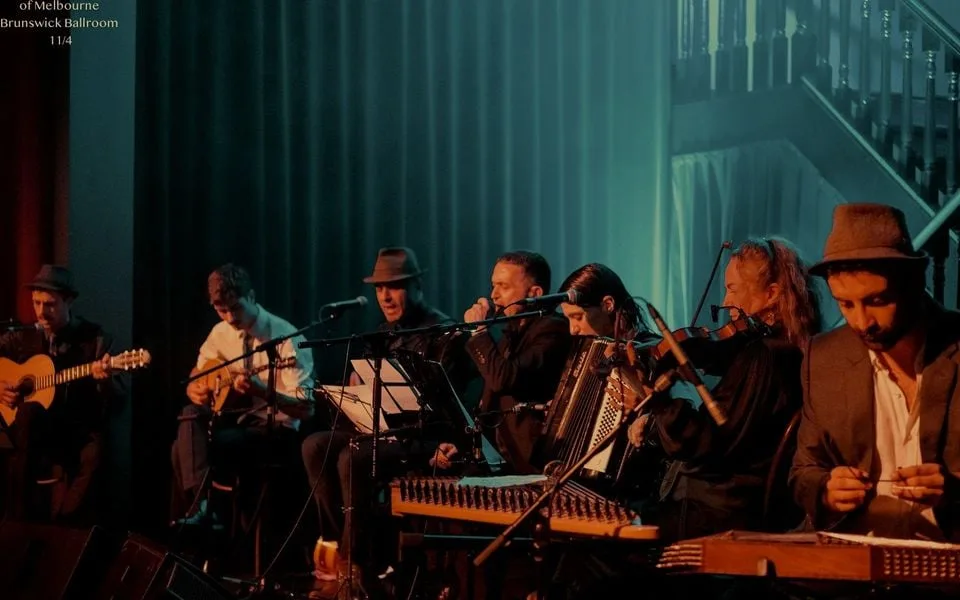
The ensemble features a group of talented musicians from diverse backgrounds: Maria Antaras-Dalamagas (Accordion / Vocals), Vagelis Ginis (Vocals), Camille El Feghali (Qanun), Jenny Dixon (Violin), Alex Petropoulos (Guitar), Paul Karalis (Bouzouki) and Con Kalamaras (Bouzouki / Vocals).
Based in the culturally rich city of Melbourne—home to one of the largest Greek populations outside of Greece—Estudiantina of Melbourne draws upon a vibrant community heritage. In this thriving cultural setting, the resonance of Rebetiko and Smyrneika is both historical and contemporary, offering a meaningful connection to the lived experiences of the Greek diaspora.
For Estudiantina of Melbourne, music is far more than performance—it is a cultural bridge that unites generations, communities, and histories. Their work enables audiences to reconnect with ancestral roots, share intergenerational stories, and celebrate a collective identity. Through the interplay of instruments such as the bouzouki, baglama, and accordion, the ensemble honours the deep musical traditions of Greece, while offering a fresh and dynamic interpretation for modern audiences.
Kindred souls
From the streets of Bamako to the ports of Piraeus, music has long been a powerful voice for the marginalised. This performance unites the rich musical heritage of West African blues and the defiant spirit of Greek rebetiko, forging a compelling connection between two traditions deeply rooted in resilience, longing, and liberation.
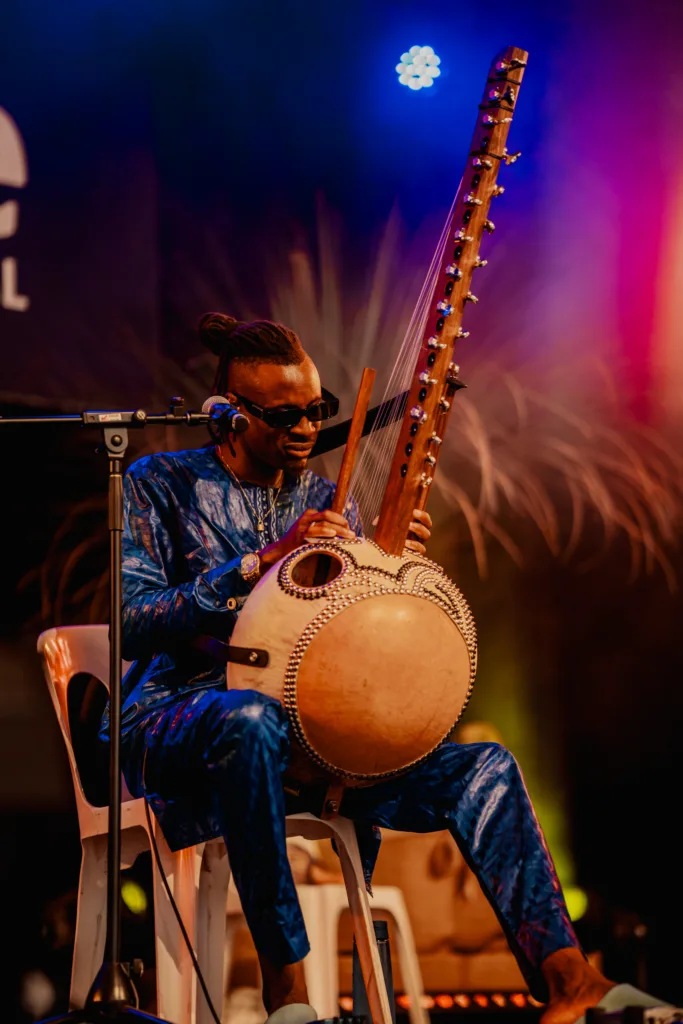
Mande Blues Ensemble and Estudiantina of Melbourne create a poignant musical conversation, where shared themes of hardship and triumph unite across cultures. This performance will celebrate the enduring power of music to transcend boundaries, a tribute to the strength and spirit that connects us all.
These two ensembles will come together for a one-hour performance – ‘Streets of Bamako to the ports of Piraeus’ – at the Melbourne Recital Centre’s Primrose Potter Salon on the evening of 29 November 2025.
